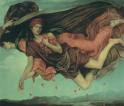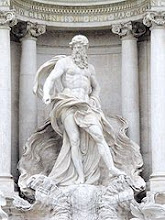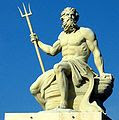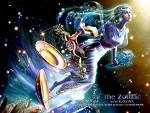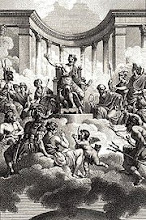
Erebus was known as the embodiment of primordial darkness, the son of Chaos (who was the void from which all things developed, known also as Darkness). According to Hesiod's Theogony, Erebus was born with Nyx (Night), and was the father of Aether (the bright upper atmosphere) and Hemera (Day). Charon, the ferry-man who took the dead over the rivers of the infernal region, is also said to be the son of Erebus and Nyx.
Later legend describes Erebus as the Infernal Region below the earth. In this version, Hades was split into two regions: Erebus, which the dead have to pass shortly after they have died, and Tartarus, the deepest region, where the Titans were imprisoned. Aristophanes' Birds says that Erebus and Nyx were also the parents of Eros, the god of love.
He is often used metaphorically for Hades itself.
In Greek mythology Erebus (Ἔρεβος, Erebos) was a son of Chaos, father of Aether and Hemera by Nyx, his sister. (Hesiod. Theog. 123.) Hyginus (Fab. p. 1) and Cicero (de Nat. Deor. iii. 17) enumerate many personifications of abstract notions as the offspring of Erebos. The name signifies darkness, and is therefore applied also to the dark and gloomy space under the earth, through which the shades pass into Hades. (Hom. Il. 8);
According to some later legends, Erebus was part of Hades, the underworld. It was where the dead had to pass immediately after dying. After Charon ferried them across the river Acheron, they entered Tartarus, the underworld proper. Erebus was often used as a synonym for Hades, the Greek god of the underworld. Also, Erebus was the name of the gloomy space through which souls passed on their way to Hades.
The word is probably from Proto-Indo-European language, *h1regwos, cognate to Old Norse rœkkr, Gothic riqis "darkness", Sanskrit rajani "night", Tocharian orkäm "darkness". Another suggestion is a loan from Semitic, c.f. Hebrew erebh and Akkadian erebu "sunset, evening" (hence, "darkness"). The same etymology of "sunset" has been suggested for Europe

